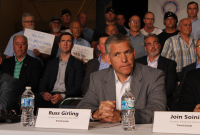Support strong Canadian climate journalism for 2025
This morning we learned that the Energy East pipeline project, the largest pipeline ever proposed in in Canada, was terminated by TransCanada.
We know our reporting played a major role in informing the public on some of the problems with the oversight process of what would have been massive new fossil fuel infrastructure for Canada, a pipeline that would have passed under some of the most cherished waterways in Canada and from the oil sands all the way to the Eastern shore.
Over the last two years, Mike De Souza, our lead energy reporter, and managing editor, diligently investigated possible conflicts of interest between TransCanada and the federal regulator, the National Energy Board, and he found them through Freedom of Information requests.
National Observer revealed that NEB panel members met privately with stakeholders, including former Quebec premier Jean Charest, to discuss the project, despite its own rules that require it to conduct reviews in an open and fair manner. Charest was working as a consultant for TransCanada, at the time of the meeting. Internal notes released through access to information legislation show that Charest gave the panelists what they asked for: political advice on how the pipeline could gain public support in Quebec.
When the public learned of secret meetings undermining with the regulatory process, public outrage boiled over into legal actions and protests, particularly in the Montreal area, where the hearings were unfolding. People wondered how Ottawa's pipeline review could be independent, when it was meeting in secret with the very company whose project it was supposed to be reviewing.
The entire Energy East review was temporarily suspended. From there on, events snowballed. The chief executive of the NEB and the review panel recused themselves, and new members with fewer industry ties were appointed by the new federal government. Climate change was introduced as a topic of consideration for review, whereas it had been banned under the previous government. Throughout, oil prices remained stubbornly depressed. In September TransCanada asked to suspend the review process for 30 days to review the project's bottom line.
This morning, TransCanada announced it will terminate the project.
Many of the facts around Energy East would have remain hidden from the public, were it not for De Souza's relentless reporting. To borrow a phrase by Rachel Maddow in praise of journalism, “every once in awhile… dogged reporting on some unsexy topic…can start to uncover the small edge of something that crescendoes” into a much bigger story.
This is the power of investigative reporting, to let the public know what is happening behind closed doors, so you, so they, so we, can make decisions that are informed, based on facts and reality.
Some are mourning the announcement in Canada. Millions of dollars and thousands of jobs were said to be at stake in this pipeline debate, and as a TransCanada executive outlined in his book, some will see the lack of a pipeline as bad news for the prosperity of future generations. Some pro-oil groups even say this is a win for "foreign oil" interests.

Perhaps Energy East would have helped the economy and been an asset to Canada. But it's striking to see that the company's stock price leapt upward after the decision.
What I do know is that climate change is real and the culprit is fossil fuels. It can no longer be pushed into the background or a future discussion. Not with extreme weather events like the onslaught of hurricanes Harvey, Irma and Maria, with the first one killing at least 70 and the latest leaving 3 million Americans without power and over a million without clean drinking water. This is happening right now, today.
And whether we build pipelines or not, Canada — along with the rest of the world — is increasingly going to have to deal with that reality, and what it means for fossil fuel projects going forward.





Comments
"... dogged reporting on some unsexy topic ..."
Merriam-Webster defines "sexy" - "sexually suggestive or stimulating :erotic; generally attractive or interesting :appealing."
I'd have to disagree that this topic is unsexy- Mike's and the National Observer's investigative reporting is stimulating, attractive, interesting, and appealing, as the truth always is.
Almost a conjugal relationship, like that of the NEB and industry!